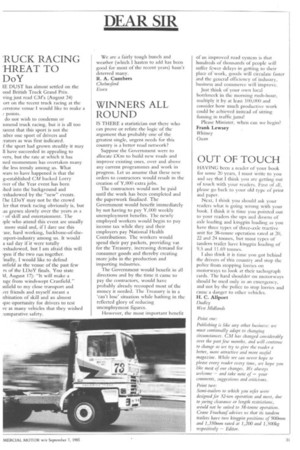WINNERS ALL ROUND
Page 33

If you've noticed an error in this article please click here to report it so we can fix it.
IS THERE a statistician out there who can Prove or refute the logic of the argument that probably one of the greatest single, urgent needs for this country is a better road network?
Suppose the Government were to allocate Xrn to build new roads and improve existing ones, over and above any current programmes and work in progress. Let us assume that these new orders to contractors would result in the creation of Y,000 extra jobs.
The contractors would not be paid until the work has been completed and the paperwork finalised. The Government would benefit immediately by not having to pay Y,000 weekly unemployment benefits. The newly employed workers would begin to pay income tax while they and their employers pay National Health Contributions. The workers would spend their pay packets, providing vat for the Treasury, increasing demand for consumer goods and thereby creating more jobs in the production and importing industries.
The Government would benefit in all directions and by the time it came to pay the contractors, would have probably already recouped most of the money it needed. The Treasury is in a 'can't lose' situation while bathing in the reflected glory of reducing unemployment figures.
However, the most important benefit of an improved road system is that hundreds of thousands of people will suffer fewer delays in getting to their place of work, goods will circulate faster and the general efficiency of industry, business and commerce will improve.
Just think of your own local bottleneck in the morning rush-hour, multiply it by at least 100,000 and consider how much productive work could be achieved instead of sitting fuming in traffic jams!
Please Minister, when can we begin? Frank Lewsey Whitney Oxon




































































































